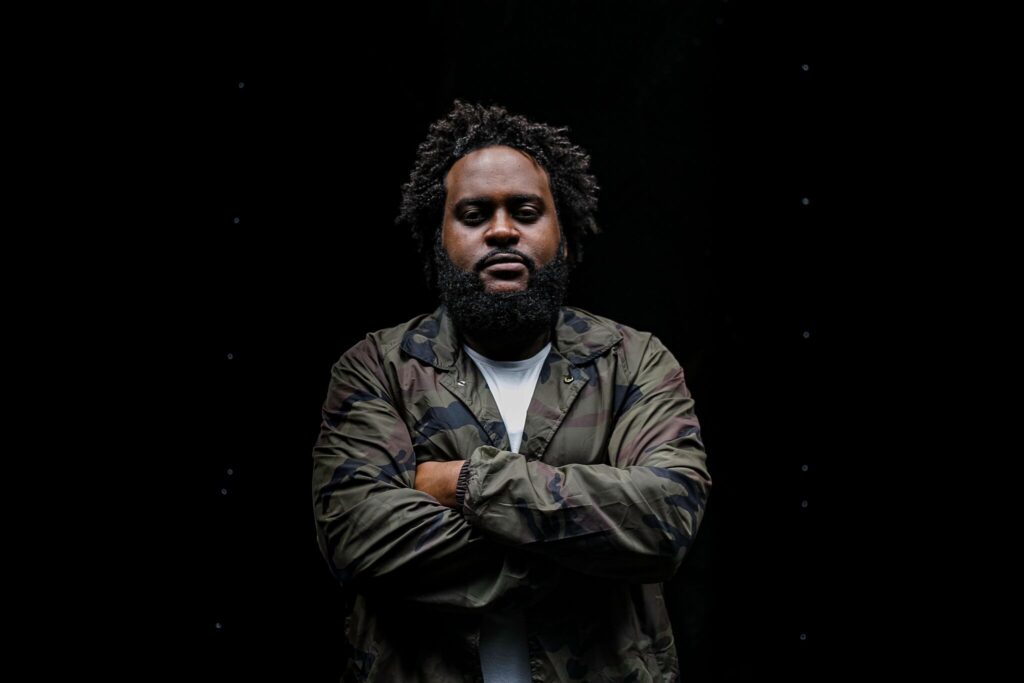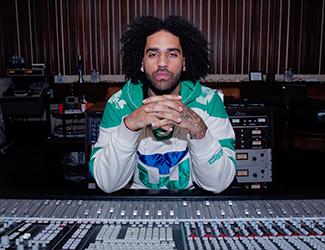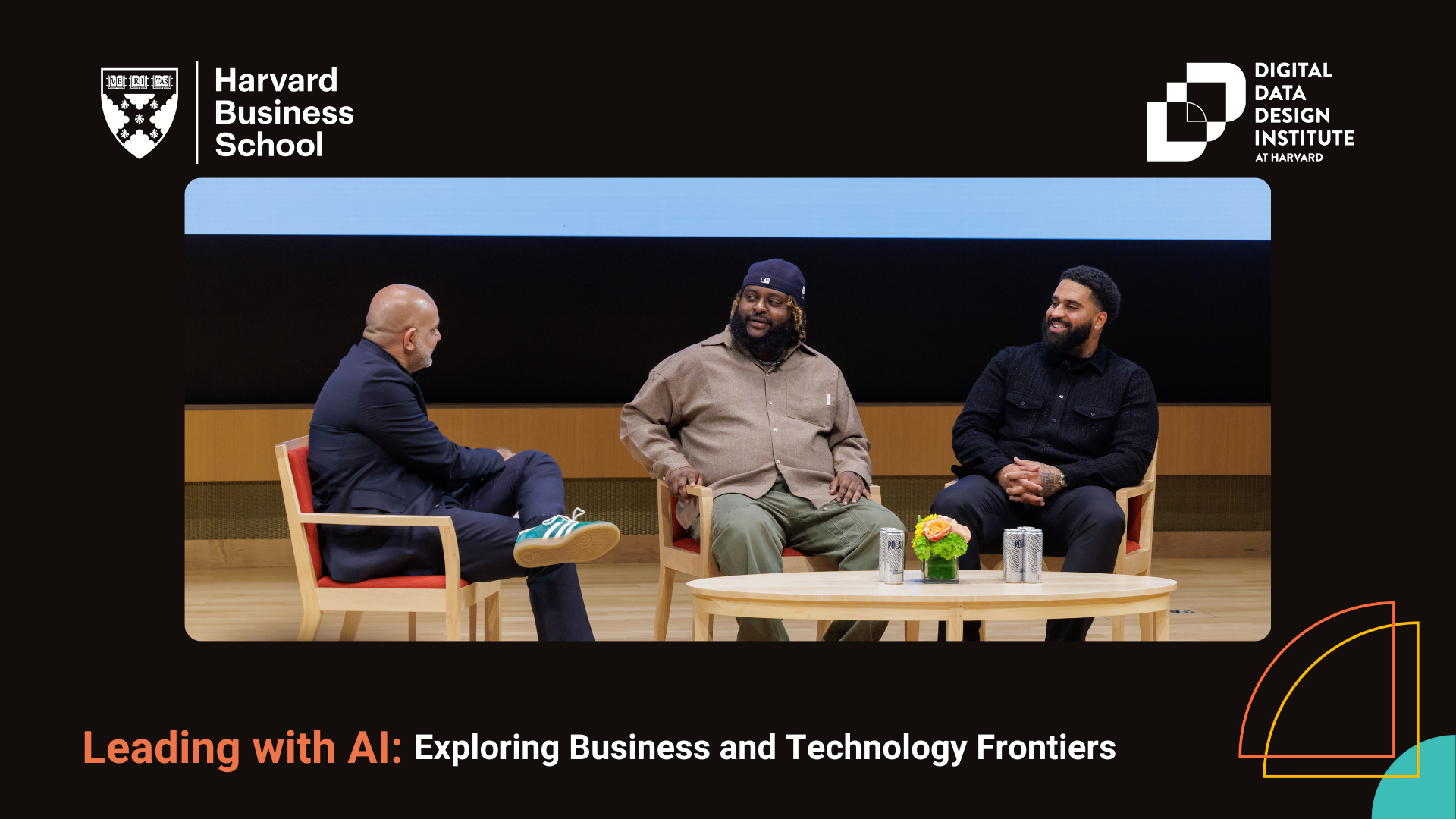On May 7, the Digital Data Design Institute at Harvard hosted Leading with AI: Exploring Business and Technology Frontiers. The conference featured a session on creativity in music hosted by Karim Lakhani, Dorothy & Michael Hintze Professor of Business Administration at the Harvard Business School and Chair and Co-founder of the Digital Data Design Institute; Derek Ali, GRAMMY Award-winning sound engineer and Founder and CEO of EngineEars; and Bas, Artist with Dreamville Records/FIENDS.
The session featured demonstrations of how AI can be used in all phases of music creation and provided perspectives on creativity and AI, now and in the future. During the discussion, Ali and Bas offered important experiences, observations, pros, and cons of different aspects of using AI in music.
Key Insight: Adopting and Using AI
“…society is better when people can express themselves. I think even if you’re making music—some people will make it not even for commercial purposes—but if…you want to sit down in front of your laptop and just create something and get your thoughts out, I think that’s healthy.”
Bas
In terms of adopting AI, the effects vary. Ali explained how producers can avoid the complex legal clearance process for portions of existing songs, how artists can test voices against different sounds anytime, and engineers can eliminate time-consuming busy work. Karim summarized these effects in three categories:
- Replacement, where engineers’ jobs might be replaced by AI.
- Augmentation, where AI becomes a “superpower” to help artists do their best work.
- Transformation, where AI spurs new uses, jobs, and roles in the future.
Key Insight: The Future of Music Creation
“…emerging technology continues to shape the landscape of musical expression. Now with the rise of AI-generated compositions, we stand at the precipice of endless possibilities, where the boundaries of creativity are only limited by one’s imagination. But this also introduces a borderless playing field that threatens the human imperfections that make up the music that society has loved and connected with for over 160 years.”
Derek Ali
Ali showed a video of Karim’s visit to No Name Studios in Los Angeles, where they walked through the music creation process. They started with a rap name for Karim and built a rap using prompts on mood, topic, voice, and musical components. During the presentation, in approximately one minute, Ali used prompts to create a 90s-style hip hop song about Mary Erdoes (CEO of JP Morgan), an R&B song about HBS Professor Tsedal Neeley, and a classical piece about HBS Dean Srikant Datar.
Key Insight: Making Sense of the Moment
“Yes, it might be detrimental to some aspects in music, but it’s allowing me to go into worlds I’ve never even had the time to go into.”
Bas
“It’s definitely one way to create, but obviously nothing trumps…the energy, the creativity that just flows in the air…with collaboration, the human element, the feeling.”
Derek Ali
Ali welcomed Bas to the discussion and showed a video of the two creating a recording from scratch. Karim then asked them to reflect on their sense of the current moment. Ali noted the time involved in revising and cleaning songs and how AI can boost efficiency. Bas observed that AI can help make music creation possible for almost anyone: “I think tech has always made music creation more accessible. You can spend two grand on a 12-hour studio session or you could probably spend the same amount of money on a laptop and Achieve interface and record in your crib.”
Key Insight: Impact on Creativity
“…AI never been to the club so like it’s a little hard for him to get that.”
Bas
In terms of creativity, Bas described how AI helps him from a technical perspective, but wondered about its ability to evoke human emotion in listeners. In his work with elite artists, Ali has observed their concerns about intellectual property and models trained on their music. But he stated that the conversations going on now can help artists move past resistance to adoption.
Key Insight: Inventing the Future
“I think the creators like us just need to stay on it, need to understand and be involved with the creation of these platforms, and to embrace it…I always say…there’s not going to be no AI song that’s going to take over the world. It’s going to be a creator using AI that’s going to take over the world.”
Derek Ali
Expanding on the transformative effect of AI, Ali and Bas reflected on what they anticipate in the future. Bas described potentially new roles in the industry, such as specialists in developing prompts. He noted that the production process is further along, as much of that work is simply mathematics. Ali also emphasized that young people thinking in new ways will develop new ways of working. Going forward, creators should embrace the changes.
Q & A
Members of the audience asked questions that prompted Ali and Bas to reflect on Taylor Swift’s ability to express the human experience, accepting and adopting AI tech, lessons they learned from mentors, and the benefits of an individual’s experience and in-person learning versus the democratization of learning and mentor availability through AI.
Bas summed up the Q&A by saying, “The thing that I’m confused about and I don’t know what the answer is, like how if you can get all the answers [from AI], then how am I learning? We all went through friction through learning, but if it’s now friction-free, if it’s just a few keystrokes, how do we learn? I think that’s the worry we have about creativity. Creativity comes from the friction, from the pain you have felt…”
Optimism for the Future
Bas and Ali expressed optimism for the future of AI in music. Bas gave examples of using AI for help with personal training and nutrition, in addition to music creation. He encouraged users to embrace AI tools to create something new. Ali noted the time-saving aspects of AI and the potential to do more and make more money in addition to “searching for the new.” Ali wrapped up the session by saying, “Definitely just use the tools to invent the future.”
Meet the Speakers

Abbas Hamad, or Bas, is a French-born Sudanese-American rapper. He signed with Dreamville/Interscope Records in 2014 to release his first album, and has released three additional albums so far. He has released and collaborated on many extended plays, singles, mixtapes, and compilation albums, and made many appearances as a featured and guest artist. In 2020, he was nominated for a Best Rap Performance GRAMMY Award.

Derek Ali, or MixedByAli, is an American mixing engineer who has worked with many elite artists in the music industry and won four GRAMMY Awards. In 2018, he founded EngineEars, a mixing platform and community startup dedicated to teaching sound engineers and changing the way the music industry operates to make it more equitable, efficient, and accessible.
Additional Resources
Bas:
- YouTube, Instagram: @bas
- X, Instagram: @thefiends
- Dreamville Records
- FIENDSHOP
Ali:
- Instagram, X: @mixedbyali
- YouTube: @EngineEars
- EngineEars
